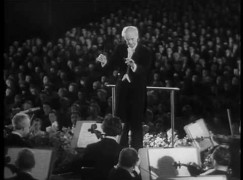Has the Berlin Philharmonic harmed its myth?
mainInteresting piece in Bild this morning, putting the failed election of a new conductor into historical perspective.
It quotes a certain Norman Lebrecht as saying that the Berlin Philharmonic has a pedigree of leadership comparable only to the British monarchy. Read here. (N. B. The British monarchy has survived greater upheavals than a bad election result.)






“Berlin Philharmonic has a pedigree of leadership comparable only to the British monarchy”
If you like the British monarchy… otherwise for us non-Brits, it’s all just one big Benny Hill sketch.
The House of Windsor are a mediocre lot even by the standards of royalty.
Gratuitously rude and unnecessary.
Germany’s Cicero magazine weighs in with a particularly hard-hitting article:
http://www.cicero.de/salon/klassik-dirigenten-nichtwahl-rattle-das-problem-der-berliner-philharmoniker-sie-selbst/59246
excerpt (quick translation by yours truly):
The Berliner Philharmoniker are their own problem. In the Rattle era they have lost much of their identity. Not only has their Klang (sound) become internationalised and therefore aligned with the global mainstream from Boston to London to Tokyo, but also the musicians of the sections, who once were proud carefully to develop the Philharmonic tradition, the rich, earthy, sound of Furtwängler, now have an international outlook. Already under Abbado, but particularly under Rattle, the “German faction” within the orchestra got competition from the US, Venezuela and other countries. While the Berliner remain faithful to their ritual of papal election, they have largely thrown overboard the ritual veneration of their Klangideal.
wow! oh, it’s brüggemann again
One very interesting detail in this article: the author claims with authority that Thielemann would be backed by the winds, while the strings would try to prevent him. The other day somebody else with equal insight and authority made exactly the opposite claim. Could it be that in reality a coalition of the percussionists and the harpists secretly rules?
I don’t know who Brüggemann is but what he says in his piece kind of makes sense to me.
Isn’t it symptomatic that, as reported on this page, a number of leading candidates withdrew from the running, Jansons by renewing his contract with BRSO, Barenboim by announcing non-candidacy and staying put with his Staatskapelle across town.
The BRSO and Staatskapelle still have a recognisable sound and conductors (at least of the older generation) may find working with these orchestras more rewarding than with a jet set ensemble that is in danger of losing its “Klangkultur”.
The Dresden and Leipzig orchestras likewise may offer richer rewards for tradition-conscious maestros. Would Thielemann or Chailly actually be interested in the BPO job? Your guess is as good as mine.
Need more of this kind of detail about what actually happened before forming views!
What Arthur said. As far as their myth is concerned I see the opposite to be true. A week long conclave, uncertainty, sleepless nights, the high priests of classical music in never-ending debates and cabal who should be the next God’s deputy on earth. Now that is the stuff myths are built upon. Not a quick two hour get together, two rounds of voting and done. That’s how you elect classroom moms, not the chief conductor of the Berlin Philharmonic. 🙂
Bild is a trashy rag and you should pay as much attention to this article as to a similar article in the Sun.
You should be surprised and gratified that a paper allegedly of the Sun’s status (there are many differences) takes an intelligent interest in the future of an orchestra.
While their (perfunctory) interest in the future of an orchestra is to be commended, the Bild nonetheless remains a paper best read with a healthy amount of caution and discernment.
On a fussy note, the Bild may wish to revisit and amend their diagram of orchestral seating orders.
Yes, the basses are on the wrong side in the “classic” diagram! 🙂
As I don’t follow British tabloid press, I can’t judge on the Sun. But Bild is indeed nothing but disgusting in any respect – and this is a polite characterisation.
Norman rudely deleted a previous comment, but I was trying to say that there’s no myth, just reality. The Berlin Philharmonic has dominated the orchestral world for a century, and this week’s vote did nothing to change that.
No orchestra “dominates”; that is absurd.
True, no orchestra dominates the music world. But what other orchestra attracts any comparable amount of public and media attention when it comes to elect a new music director? Not even the Concertgebouw, arguably an orchestra of a similar caliber.
There is NO such thing as the greatest orchestra or the orchestra that dominates. And Berlin Phil’s not dominant position is confirmed by the fact that the greatest conductors were not interested in it.
Let’s not be so quick to jump to conclusions. The older conductors, like Jansons and Barenboim, may have decided they didn’t want the rigor of the job. That doesn’t mean they think the post lacks power. It may be that they thought it had too much power and too much workload. The younger conductors? Do they want to be with the orchestra for 40-50 years? If not, how will they prevent their career from becoming anti-climactic?
Keep in mind that no one actually declined the job. Those who appeared to drop out may have done so just so we couldn’t say Berlin wasn’t interested in them.
Excuse me but how do you know that no one declined the job? were you in the conclave? You are jumping to conclusions too.
There are no reports that anyone declined the job, so an honest person would never imply that someone had.
Anyone who thinks the Berlin Philharmonic doesn’t dominate the orchestral world should ask him/herself why there is so much discussion on SD and in other media about the BPO, and so much less about any other orchestra.
The fact is that the Berlin Philharmonic is iconic in a way no other orchestra is, not least because they get to determine their own future. [It doesn’t hurt that they play magnificently.] We all seem to recognize this, implicitly if not explicitly. That is why so much digital and physical ink have been devoted to the orchestra over the last few days- and so much nonsense published by various “experts”, whose only common characteristic is a complete lack of knowledge of the actual details of the event of interest.
For someone who disdains critics, you sure spend a lot of time monitoring them.
The unique conclave voting of the Berlin Philharmonic is what fuels the media interest and the public’s speculation. No need to dig deep on that one.
And orchestras in Amsterdam, Chicago, Dresden, Leipzig, London, Los Angeles, Moscow, Munich, St Petersburg, Vienna, and a certain New York pit are fully the equal of the Berlin Philharmonic nowadays.
“The unique conclave voting of the Berlin Philharmonic is what fuels the media interest and the public’s speculation. No need to dig deep on that one.”
Ah, not really. Why was there so much media attention when Rattle announced he was leaving the orchestra? Or whenever the orchestra goes to New York or London? The election process is novel, just like everything else about the orchestra. It makes a better news story, sure, but we can be assured there would be plenty of talk without it.
I won’t argue over taste, but all you need to do is to start listening to the great conductors themselves to discover that your sentiment about Berlin having many equals is a minority position. It’s your right to have such a position, but you’re out of place when you try to reprove others for holding the near-consensus position among experienced musicians.
As for monitoring critics, I wish it wasn’t necessary. But a good fact-checking is appropriate on this blog on occasion.
First heard your Berliners in Fidelio under a reasonably great conductor when you were about minus 25, based on previous references to your age. And what is this “near-consensus position among experienced musicians”? Most musicians I talk to hotly dispute rankings.
I never said anything about “rankings”. I’m just repeating the widely held sentiment that, if you will, there are the world’s greatest orchestras and then there is the Berlin Philharmonic. That’s different than being voted #1 or #2, or any other such irrelevancy. Berlin holds a special claim to being unique.
Yes, I’m young. I would think that classical connoisseurs would be glad to see the new generation showing an interest in great music. I’ve gone as far as to spend thousands of dollars building my library, studied piano intensely for most of my teen years, and I’ve made my own site for music criticism. But if you want to write me off for being too young, that’s your prerogative. Just don’t expect anyone to take you seriously when you talk about bringing classical music up to date and relevant.
Then don’t invite others to “start listening to the great conductors.”
If you wish to put Berlin on a pedestal, go ahead. But my experience tells me that the highest standards exist more widely today, in all the cities I listed.
WIth your “fully equal” comment you fall victim yourself to the ranking fallacy. I know most of these orchestras rather well. Still, what makes the Berlin Phil special is: All of these top orchestras play in a range from stellar to crappy performances at times, depending on many factors. No other orchestra I know plays so consistently on a high level, at least for the factors that are under their own control, technically, intonation, precision, good balance in the string groups, etc., than the Berlin Phil.
I don’t believe in dominance in the arts. Even in say 1967, when the BP came close at least in terms of marketing, you still had the Wiener Philharmoniker, the Concertgebouw and the LSO at golden peaks.
But I do think it’s realistic to rank generally, as in the Chattanooga Symphony Orchestra not being on the same level as another CSO. Don’t you agree?
None of the orchestras I was referring to ever turn in a “crappy” performance.
This statement cannot be supported: “No other orchestra … plays so consistently on a high level, at least for the factors that are under their own control, technically, intonation, precision, good balance in the string groups, etc.” Too many variables. Too much subjectivity.
Crappy is relative of course. I have heard Vienna, Dresden, NY, a few others on your list, in not so well rehearsed performances, to forget about… I have never heard Berlin Phil sink that low. Now don’t get me wrong, that’s not the soul of music, I agree. But technically the Berlin Phil is the most impressive orchestra for me as far as the average quality and consistency of the orchestra musicians is concerned.
Still I must specifically disagree. In terms of pure consistency, their weekly broadcasting needs and long-standing broadcasting work patterns and set-up make the Bavarian Radio Symphony Orchestra the most technically consistent of all.
Broadcasting? Not very relevant. That’s certainly not a decisive game changer. There are many radio orchestras who broadcast on a weekly basis. Radio orchestras usually also are the most ‘monocultural’ of all. Duty is always the same old. Not much variation, pampered working conditions, lots of spare time, 30% less “Dienste” compared to Vienna, Dresden or Leipzig. BR SO pays good salary for relaxed duty. That’s why they could attract a lot of good players.
Not true at all, certainly not for most German radio orchestras. They often play a more varied repertoire than many non-radio orchestras, including quite a bit of contemporary music. And when first class musicians get adequately paid for their skills and given good work conditions, that doesn’t mean they are “pampered”.
Michael Schaffer, nothing wrong with getting paid adequately, not what I said. SDreader claimed that the broadcasting duties would make the BR SO a better orchestra. I explained why that is not relevant much. Not when it comes to defining the standards of the best orchestras of the world. This is a thread about the Berlin Phil. Apparently BR SO has a good lobby here. 😉
And the radio orchestra unfortunately do not play much (unpopular) modern music, but rather compete with the concert orchestras for the mainstream repertoire. Quite a travesty actually, if you think about, why radio orchestras exist in the first place and how they are financed.
“…a pedigree of leadership comparable only to the British monarchy…”
Why? Because the British monarchy is mostly German? 😉
“Londons Kritikerfürst Norman Lebrecht
Oh wow, Norman! London’s Kritikerfürst” – “prince of critcs”. What an honor! 🙂
“Then don’t invite others to ‘start listening to the great conductors.’”
Why, because I’m young?
No, because many of us started listening a long time ago.
I’ve been listening to classical music my entire life, literally. You’ve been in this longer than I have, admittedly. But since you seem to know so much more, do you have a site with any music reviews or commentary?
It’s not a question of knowing “so much more” but a dislike of being told to “start listening.”
Your notion that one orchestra “dominates” is not just inaccurate but anathema to music, or any art.
And when you point out that our host is rude and his posts “hogwash,” it is hard to see you as a nice kid needing to be encouraged.
Andrew, I myself am proud that someone as young as you are passionate about classical music. The young are our hope for survival of classical music and I read your music critic site regularly. It’s one thing to just attend a concert. It’s another to be passionate about it. The BPO will do just fine after this well-publicized no-decision. There have been several disagreements among BPO players for decades, and they are still some of the most passionate players, still working well together, whether young or old. I’m looking forward to getting back to normal this weekend with Jarvi/Wang!
Indeed, John. I’ve been reading Andrew’s blog and his Amazon reviews and I think he is pretty good. I’ll follow your next steps closely.
In America alone you have absolutely the highest possible musical standards in Boston, Cleveland, Minnesota, Dallas, San Francisco in addition to NY, Chicago, Philadelphia, Baltimore and Pittsburg. Only non-musicians indulge in the idiotic pastime of ranking orchestras. The BPO may be an iconic orchestra in a way only a handful are but this is largely for historic reasons. We are stunningly fortunate to be living in an age of unsurpassed orchestral achievement. Nicholas Oppenheim.
The problem with the Berlin Philharmonic is that they have become a technically perfect, but soulless, machine. They have no common spirit, 129 individuals… They need to find a meaning, and it looks like there is no “Messiah” conductor out there who could give it to them.
Berlin Phil should reorganize to become Berlin Chamber Orchestras, each sub-orchestra follows the conductor-less Orpheus Chamber Orchestra model, alternate every other few weeks to play.
There you have it. Some could focus on just playing core German pieces, some playing modern, avant garde pieces, some playing genius on BBQ pieces, et al.
When they have extra cash and feel like spending it, invite any world renowned conductor to be their human metronome of the night.